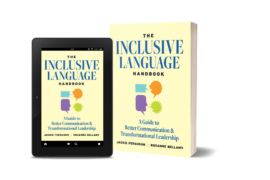During the last month of the year, the days fly by as we prepare for holiday celebrations with family, friends, and coworkers. We hear seasonal music everywhere, and the festive feeling has us wanting to share holiday greetings with everyone. But is “Merry Christmas” appropriate for work? You might wonder: How can I spread the joy of the season without offending my colleagues?
Holiday greetings are a great opportunity to use inclusive language in the workplace, because not everyone celebrates the same winter holidays. There’s Hanukkah, Christmas, Kwanzaa, Winter Solstice, New Year’s Day, and more. Language can help dispel the notion that there is one December holiday that is “normal,” while others are not. This, in turn, builds a culture of belonging and mutual respect.
For many, “Merry Christmas” is a tried-and-true standard. But that traditional greeting doesn’t encompass today’s diverse, multicultural workforce. Instead, it’s more inclusive to wish everyone “Happy Holidays.”
Festive Wishes for All
When addressing a large group or speaking to a coworker, customer, or work partner whose beliefs you are unsure of, “Happy Holidays” is a perfect greeting, because it encompasses many celebrations across many cultures. Of course, as you get to know your work colleagues better, you may learn aspects of their personal identities and beliefs. Or, you can certainly ask, “What are you celebrating at this time of year?” In either case, a more specific holiday wish like “Happy Hanukkah,” “Joyous Kwanzaa,” or “Merry Christmas” is certainly appropriate.
In recent years, these seemingly innocuous phrases have become political statements, with some calling “Happy Holidays” part of the so-called War on Christmas. Companies such as Target, The Gap, and Starbucks have been caught in the crossfire by avoiding “Merry Christmas” in their signs and ads, and choosing the more inclusive greeting. Many companies avoid the discussion altogether and simply switch to festive packaging themed in red, green, and white.
Create Feelings of Belonging
Critics of “Happy Holidays” say the secular greeting undermines their Christian heritage, but using inclusive language will never take away from our own beliefs or celebrations. Rather, respectful, thoughtful language effectively allows the recipient of our greeting to feel included and valued. And isn’t that the goal? According to WorldAtWork, employees who feel included, valued, and comfortable are more engaged in their work, contribute more, and provide an overall better and more productive work environment.
It’s easy to get caught up in the Christmas blitz, but it’s important to stop and consider how to create a welcoming professional environment for employees who don’t celebrate the holiday. If employees feel defined by their otherness or feel excluded from workplace culture, they are less likely to contribute ideas, less likely to do great work, and are more likely to look for employment elsewhere.
Be Intentional and Prepared
As you prepare for the upcoming holidays, consider how you can spread the festive spirit and feelings of belonging. Using intentional, inclusive language requires us to continually examine our unconscious biases and linguistic customs. Learning to do it well requires education, mindfulness, and repetition — which lead to word choices that are respectful and welcoming. If you make a conscious effort to say “Happy Holidays,” it will soon become second nature.
So go ahead and share the holiday cheer with confidence that you are using language that demonstrates inclusion and respect for all.
Learn more about inclusive language by ordering The Diversity Movement’s first full-length book: The Inclusive Language Handbook: A Guide to Better Communication and Transformational Leadership.















